21 Mar 2014 | Egypt, News and features, Politics and Society, Religion and Culture
Singer Nancy Ajram is among those whose videos have been banned by Egypt’s censorship committee.
In a move that has sparked concern among Egyptian secularists, the country’s censorship committee this week banned 20 music videos allegedly containing “heavy sexual connotations” and featuring “scantily-dressed female singers and models.”
The decision to ban the video clips deemed “inappropriate” and “indecent” by members of the state censorship committee, comes two months after a new constitution guaranteeing freedom of expression and opinion was approved by 98 per cent of voters in a national referendum. The new charter replaced the 2012 constitution, widely criticized by rights organizations and revolutionary activists as an “Islamist-tinged” document.
The majority of Egypt’s secularists who celebrated the ouster of Islamist president Mohamed Morsi in Tahrir Square in July had feared that the Muslim Brotherhood –the Islamist group from which he hails –was seeking to alter Egypt’s ‘moderate’ identity. The Islamist group has since been outlawed and designated a terrorist organization by the military-backed authorities that replaced the toppled president.
The banning of the video clips comes amid heated debate on “raunchy” music videos broadcast on some of the Arab satellite channels. In recent years, an increasing number of popular Arab female singing-stars have challenged social norms and broken cultural taboos by revealing more flesh in their video clips. The trend has stirred controversy in Egypt’s deeply conservative Muslim society with many Egyptians rejecting what they describe as “the pornification of pop music”. They insist that the “graphic, semi-porn sexual scenes featured in some of the music videos are not in line with Islamic tradition and culture”.
“Some of these video clips are more porn than music. We can hardly understand the lyrics; They are an insult to Arabic music and culture,” said Amina Mansour , a Western educated 30 year- old Egyptian freelance photographer.
It is no surprise that some liberal, westernised Egyptians agree with ultra-conservative Muslims in their society that the videos should be banned. Egyptian society–once a melting pot of different cultures has grown more conservative in the last 30 years. In his book Whatever Happened to the Egyptians, Economist Galal Amin blames the growing conservatism in the country on the introduction of Wahhabism –a more rigid form of Islam practised in Saudi Arabia and adopted by the millions of Egyptian migrants who travelled to Gulf countries after the oil boom in the seventies, seeking higher-paid jobs. The gradual transformation from a diverse, open and tolerant society into today’s conservative and far less tolerant Egypt is evident in the style of dress, behaviour and speech of many Egyptians. An estimated 90 per cent of women wear the hijab-the head covering worn by Muslim women -while the niqab, a veil covering the face , has become more prevalent in recent years.
Some analysts believe the trend of conservatism, which had steadily grown in Egypt recent decades, now appears to be regressing. A growing number of women and girls are removing their Islamic headscarf —once adopted as a political statement against the authoritarian regime of Hosni Mubarak and against Western-style values imposed on the society. Leila el Shentenawy, a 31 year old lawyer told Index she removed her veil after Morsi’s ouster to express her disappointment with Islamist rule.
“Morsi failed to deliver on promised reforms,” she said, adding that she and other liberal Egyptians were alarmed by the calls made by some hardline Islamists to bring back female genital mutilation and lower the age of marriage for girls.
“We were becoming a backward society instead of moving forward,” she said.
Shentenawi however, supports the ban on the video clips, arguing that such videos are “commercialization of women’s bodies and a downright insult to women.”
Other Egyptians have meanwhile expressed disappointment over the banning of the video clips, perceiving the move as “a reversal of the democratic gains of the January 25, 2011 Revolution” that toppled autocratic president Hosni Mubarak and the subsequent uprising against Islamist rule in June 2013.
“We had two uprisings for freedom and a modern, democratic society,” lamented 26 year-old graphic designer Amr El Sherif. “The video clips are popular with young Egyptians and the latest ban can only be considered as a means of stifling free artistic expression.”
In January, Egyptian TV imposed a ban on several video clips reportedly containing “seductive scenes”, deciding they were”inappropriate for viewers”. The ban on the music videos featuring Middle Eastern pop idols Haifa Wahby, Alissa, Nancy Agram and Ruby among others, came in response to complaints by some viewers that the “hot scenes” depicted in the videos were “provocative” and “went against the morals of Muslim society.”
While modest by Western standards, “the gyrations and revealing costumes featured in the videos were too sexy for Arab audiences”, the censors decided. The ban is a continuation of the ultra-conservative trend started by Islamists during their one year rule when some of their lawmakers had complained to Parliament (then dominated by Islamists) that “Egyptian performer Ruby’s pelvic thrust dance moves and bare midriff were too much,” warning that the “obscene scenes” depicted in the music videos would “trash the taste of Egyptians.”
The ban of the videos meanwhile, coincided with the sexual assault of a female student by a mob on Cairo University’s main campus on Monday–the first violence of its kind on an Egyptian university campus. While condemning the assault incident in a telephone interview broadcast on the private ONTV channel later that evening, University President Gaber Nassar implied the victim was to blame, saying her “immodest attire” had invited the assault. He urged students to dress modestly, adding that those who do not follow the university’s regulation would be barred from entering the university campus by security guards.
Some Egyptians believe that the “suggestive” and “explicit” music videos are partly to blame for a surge in incidents of sexual harassment and violence against women in the country since the January 2011 uprising.
“Sexual frustrations of youth –many of whom are unemployed and unable to afford the cost of marriage– are being fuelled in part by sexy music videos and other pornograhic material on the internet, causing unruly behaviour by some youth,” Said Sadek, a Cairo-based Political Sociologist and activist, told Index.
The recent ban on the video clips also comes hot on the heels of an International Women’s Day protest-rally staged by nude Arab and Iranian women in the Louvre Art Museum’s Square in Paris, calling for “equal rights” and “secularism” in their respective countries. Egyptian internet activist Alia Al Mahdi was among the participants in the Paris nudist rally which organizers said, was held to “highlight the many legal and cultural restrictions imposed on women in the Arab World”. El Mahdi had also protested naked outside the Egyptian Embassy in the Swedish capital Stockholm in December 2012 to express her opposition to what she called Morsi’s “Sharia Constitution.” Raising the Egyptian flag, she had the words ” No to Sharia” written in bold print on her naked body.
Many of the revolutionary youth-activists who led the uprisings in Tahrir Square in January 2011 and June 2013 had hoped the downfall of two authoritarian regimes would usher in a new era of greater freedoms including freedom of expression and opinion.But their hopes are fading fast amid increased restrictions and a climate of growing repression.Despite the challenges, they vow to continue to push for “reforms” and “a more liberal Egypt”. While many of the revolutionaries say they oppose Alia Al Mahdi’s method of protest, perceiving it as ” extreme”, they insist ” there is no going back to repression and censorship by the authorities.”
“We’ve had our first taste of freedom with the revolution three years ago and once you’ve had that, you can only move forward and never look back, ” said Mohamed Fawaz, an activist and member of the April 6 Movement, one of the two main groups that mobilized protesters for the January 11 mass uprising. Meanwhile, the battle between secularists and conservatives for the soul of the “new Egypt” continues.
This article was posted on 21 March 2014 at indexoncensorship.org
17 Mar 2014 | Egypt, Middle East and North Africa, News and features
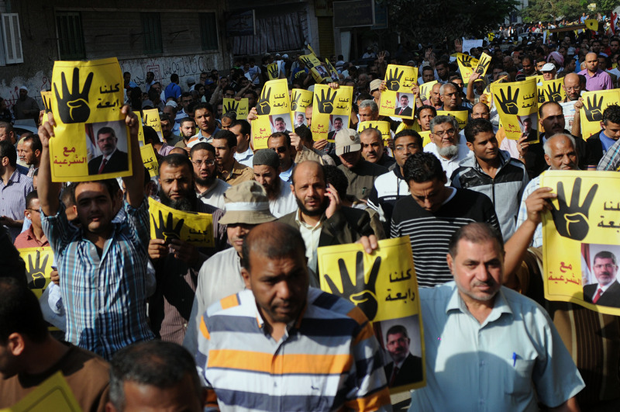
Supporters of the Muslim Brotherhood and Egypt’s ousted President Mohammed Morsi (Image: Nameer Galal/Demotix)
Amid deep polarisation and a widening crackdown on dissent in Egypt, the country’s military-backed authorities have now taken their conflict with the outlawed Muslim Brotherhood to a new front — houses of worship.
Egypt’s mosques have become the new battleground in the country’s political standoff, with the authorities recently introducing a set of measures to control religious discourse and silence pro-Muslim Brotherhood clerics they accuse of “mobilising anti-military protests and inciting violence”.
The latest measures include forbidding prayers in small mosques that are not under state control, and restricting sermons to graduates of Al Azhar University — Sunni Islam’s most prestigious institution. In recent months, no fewer than 55,000 imams lacking such credentials, have been dismissed from their jobs.
Ministry of Religious Endowments officials defend the move, insisting it is “necessary to stop lay preachers from exploiting the pulpits to advance their political interests”. For decades, the country’s mosques and universities have been fertile ground for enrolment of Muslim Brotherhood recruits and the spread of the Islamist group’s ideology. The Muslim Brotherhood , which rose to power following former president Hosni Mubarak’s ouster in February 2011, was designated a terrorist organisation by authorities in December.
In another controversial move tightening the state’s grip on mosques across the country, the Ministry of Religious Endowments has unified the theme of the weekly mosque sermons preceding Friday noon prayers. Previously, Egypt’s imams or preachers were free to choose the topic of their weekly sermons but it is now the ministry that decides what the imams should preach to the millions of worshippers attending Friday prayers.
Since the measure came into effect on 31 January, the ministry has announced a different theme each week on its official website, addressing topics that affect the daily lives of millions of Egyptians. In recent weeks, preachers have tackled a broad range of issues including developing squatter areas, environmental pollution and the role of youth in the society. The ministry has also been handing out guidelines to preachers at mosques under its control, warning that violators “will face dismissal and prosecution”.
Despite the warnings, some preachers remain defiant, refusing to comply with the instruction. They say they are the ones who should decide what to tell their followers.
“I will not be dictated by the state,” said Khalaf Massoud who preaches at the Montazah Mosque in the working class neighbourhood of Imbaba, adding that his duty is to “obey God” not “those in power”.
Other preachers have also denounced the measure as “a restrictive procedure that stifles free speech and religious freedoms”. But not all preachers are against the measure and some have even welcomed it, perceiving it as necessary for unifying the country and defusing current political tensions.
In an interview broadcast on CCTV on Friday, Imam Yasser Khattab who preaches in several mosques, said: ” The Muslim Brotherhood manipulated people and spread Islamist fundamentalism through their mosques. They incited hatred and divided the society in the last three years. There should be a stand.”
Since the toppling of Muslim Brotherhood President Mohamed Morsi by military-backed protests in July, clashes sparked by heated debate between Muslim Brotherhood supporters and opponents have frequently occurred in and around mosques after Friday noon prayers.
With a limited number of monitors to supervise the religious discourse, it is difficult for the ministry to keep track of rebel preachers refusing to abide by the new rule. Last week, four imams were summoned for interrogation at the ministry after they had allegedly called for anti-government protests during their sermons. The risk of criminal prosecution however, has failed to deter preachers like Massoud who vows to continue “to criticise any wrongdoings as people turn to me for religious guidance”.
The latest move by Egypt’s Ministry of Religious Endowments is part of the widening crackdown on Islamists and comes hot on the heels of other repressive measures taken by the authorities to curb dissent. Since the ouster of Islamist President Mohamed Morsi, the regime that replaced him has closed down TV channels and publications with links to the Muslim Brotherhood. It has also arrested and detained thousands of the group’s supporters while security forces have killed at least 1,400 Brotherhood loyalists. But with inadequate funding and insufficient manpower, it will be a daunting task for the ministry to exercise control over the country’s estimated 130,000 mosques — 10,000 of which are already independent of the state. Skeptics say it may be an impossible feat to undertake as the ministry’s resources are already stretched thin.
This article was posted on March 17, 2014 at indexoncensorship.org
6 Mar 2014 | Egypt, Middle East and North Africa, News and features
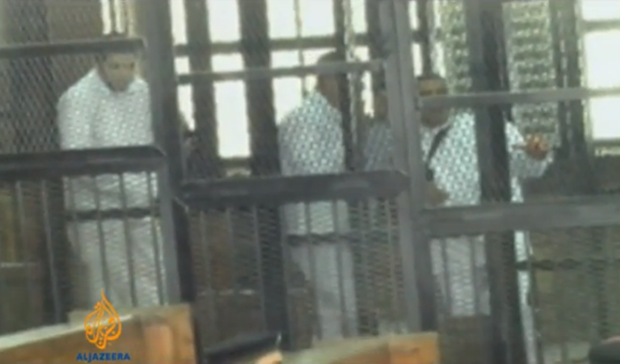
(Image: Al Jazeera English/YouTube)
The trial of 20 journalists charged with spreading misinformation and aiding or belonging to a terror cell has been adjourned until March 24.
Only six of the defendants — including three who work for the Al Jazeera English (AJE) service — appeared in court on Wednesday, eighteen days after pleading not guilty to the charges levelled against them.
The widely publicised case known to Egyptians as the “Marriott Cell” case is a test for the new Egyptian authorities’ tolerance of free speech and press freedom, say rights organizations and press freedom advocates. Last week, journalists in cities around the world held rallies outside Egyptian embassies to express their solidarity with the Al Jazeera detainees. Meanwhile, an online Avaaz petition launched a few days before the resumption of the trial on Wednesday and calling for the release of the detained journalists, had already collected more than 50,000 signatures by the time the court session opened at the Torah Police Institute in Cairo.
Al Jazeera has rejected the charges, expressing its disappointment at the trial’s adjournment. “Our journalists were simply doing their job, covering and challenging all sides of the story in Egypt,” Al Anstey, managing director of Al Jazeera English, said. “To continue to keep them behind bars after such a long time in detention is simply outrageous, so we continue to call for their immediate release.”
Australian journalist Peter Greste, Egyptian-Canadian AJE Cairo Bureau Chief Mohamed Fahmy and producer Baher Mohamed, arrested on December 30, remain behind bars at Cairo’s Torah Prison after the judge declared the trial’s adjournment “to allow more witnesses to be heard”. Abdulla El Shamy, a fourth Al Jazeera journalist who has been in jail since August 14 and is on hunger strike to protest his confinement, did not appear in court on Wednesday.
At Wednesday’s session, the judge examined “the evidence” provided by the prosecutors in the case: equipment seized by the police when they raided the hotel suite used by the Al Jazeera team as a makeshift studio. To foreign journalists attending the trial, the set of cameras, laptops , mobile phones and electrical cables displayed in court looked much like the regular set of tools used by journalists to do their work.
At the start of the session, Soheib Saad, one of the defendants shouted out from the steel cage “journalists are not terrorists.” He was arrested at a checkpoint and told the court he had been tortured by members of the national security apparatus before being brought to prison. He added that he had been denied family visits for 40 days and was not getting enough food. Soheib also told the judge he did not know what he was doing there as he had no connection with the detained Al Jazeera journalists.
Mohamed Fahmy pleaded to the Judge to release him on guarantees from the Canadian embassy that he would not travel abroad. “I would never betray my country,” he insisted. Fahmy whose right arm was in a sling because of a shoulder injury sustained before his arrest, complained that he had been denied medical treatment for his injury and that he was sleeping on the floor.
Peter Greste spoke little during the session, merely responding with “I’m here” when he heard his name called out by the judge. With no interpreter on hand to translate the court’s proceedings, he appeared frustrated that he could not understand what was being said in the courtroom.
An eyewitness from national security services who testified in the case admitted that he did not know the difference between Al Jazeera English and the network’s sister channel Mubasher Misr, accused by many Egyptians of being a mouthpiece for the outlawed Muslim Brotherhood. “I am not a media person so I wouldn’t know the difference,” he told the court. Asked if he believed Mohamed Fahmy was a member of the Muslim Brotherhood, declared by Egyptian authorities in December to be a terrorist organisation, he replied, “Fahmy works for a network that incites violence and portrays Egypt as being in the midst of a civil war so yes, he is a member of the terror cell.”
Another witness who is also a member of Egypt’s national security apparatus and who will testify at the next court session told Index outside the courtroom: “This is a war for Egypt’s very survival, for its existence. Anyone posing a threat to the country’s national security must be annihilated.”
In a country rife with conspiracy theories of plans by external powers to destroy Egypt and divide the country, his chilling words do not bode well for the fate of the Al Jazeera detainees.
This article was posted on March 6, 2014 at indexoncensorship.org
27 Feb 2014 | Egypt, Europe and Central Asia, Middle East and North Africa, News and features, United Kingdom
Comedian Andy Parsons and Channel 4 chief correspondent and presenter Alex Thomson were among the people gathered at Trafalgar Square today, in support of Al Jazeera journalists facing trial in Egypt on terror charges. Sue Turton, an Al Jazeera reporter who is accused of the same charge, was also present . The crowd staged a silent protest by taping their mouths shut and releasing black balloons.
The protest was part of a global day of action, where people around the world were asked to, at midday, cover their mouths, take a photo of themselves and post it online under the hashtag #FreeAJStaff.
Twenty journalists have been charged with “fabricating news and assisting or belonging to a terror cell”. Eight are in custody, including Al Jazeera’s Peter Greste, Mohamed Fadel Fahmy and Baher Mohamed. They have been imprisoned since 29 December and were last in court on 21 January, where they declared: “We are strong and we shall walk free”. The trial has been adjourned until 5 March.
Images from the protest below.
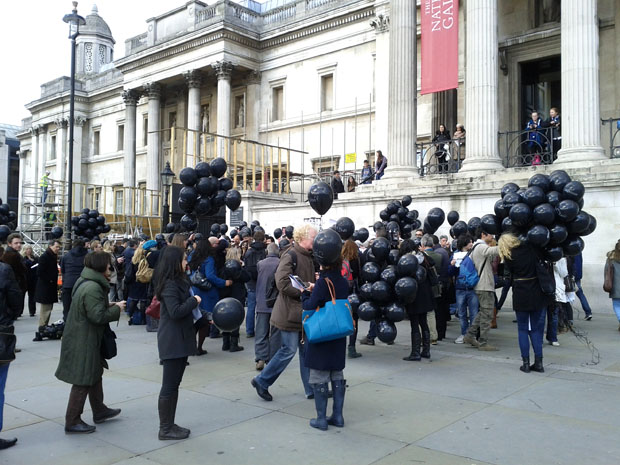
(Image: Index on Censorship)
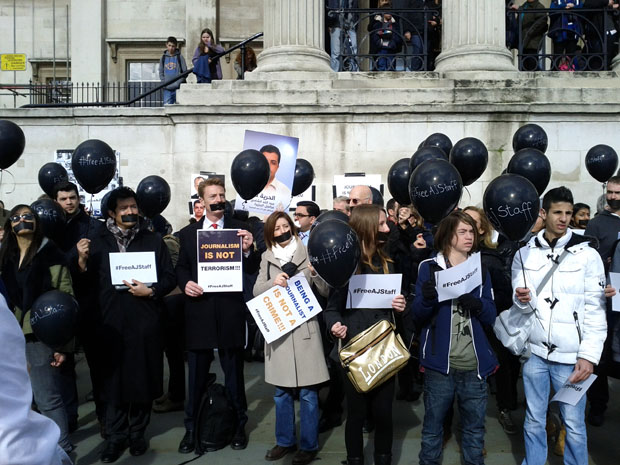
(Image: Index on Censorship)
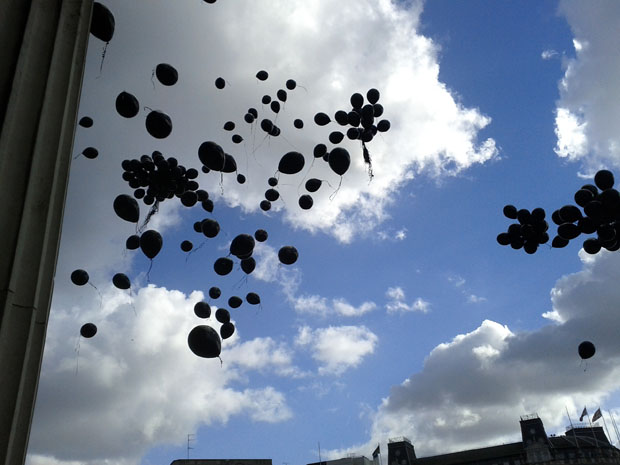
(Image: Index on Censorship)
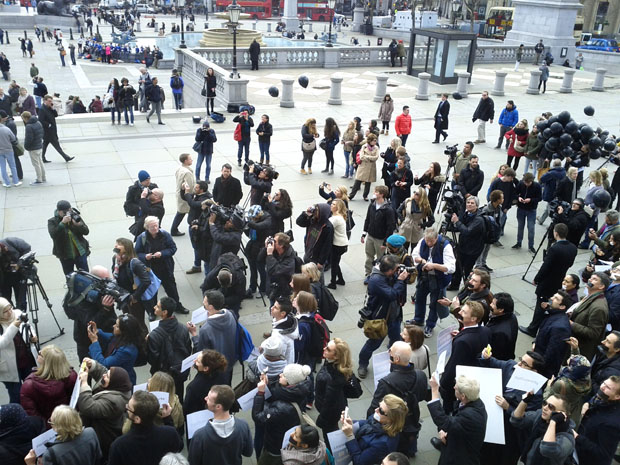
(Image: Index on Censorship)
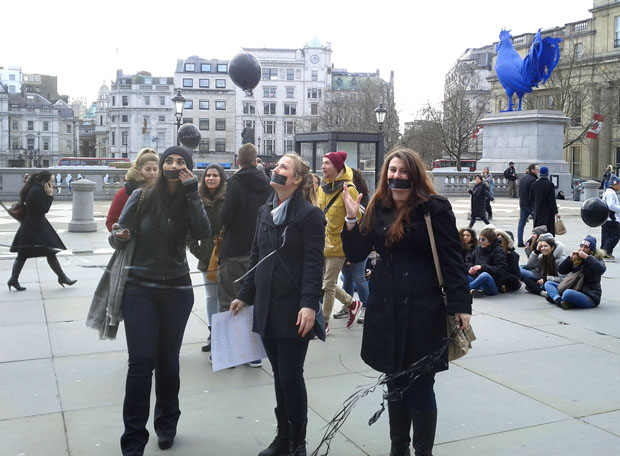
(Image: Index on Censorship)
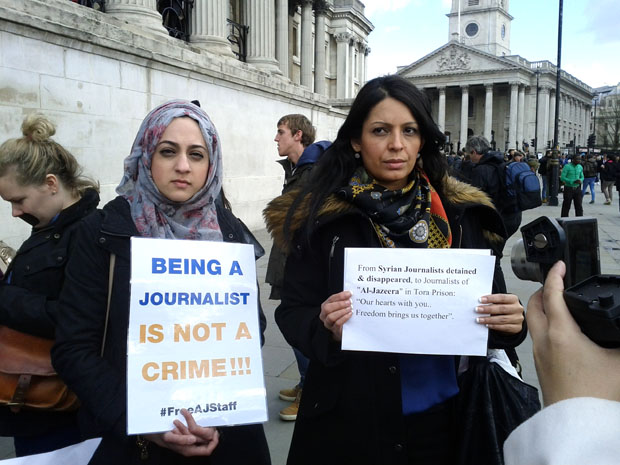
(Image: Index on Censorship)
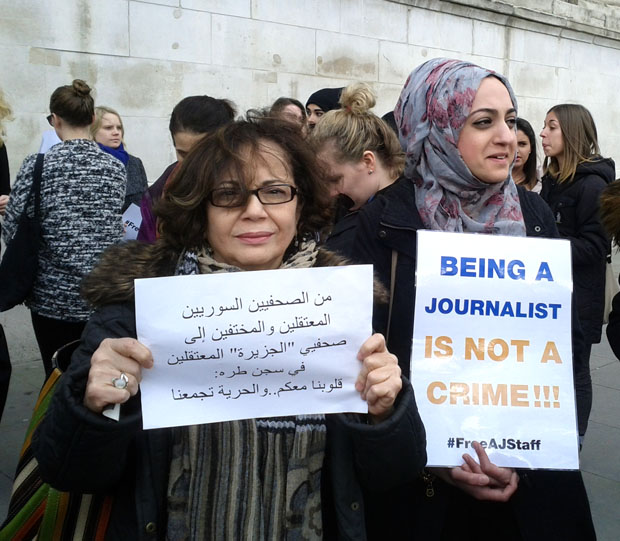
(Image: Index on Censorship)
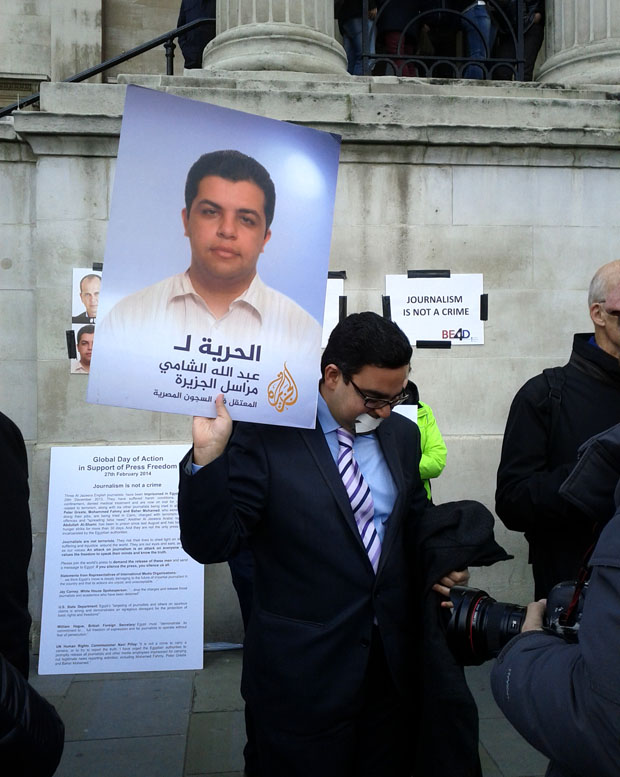
(Image: Index on Censorship)
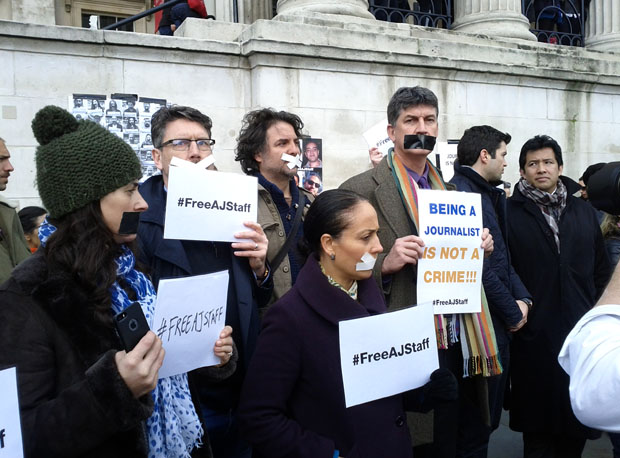
Alex Thomson (Image: Index on Censorship)
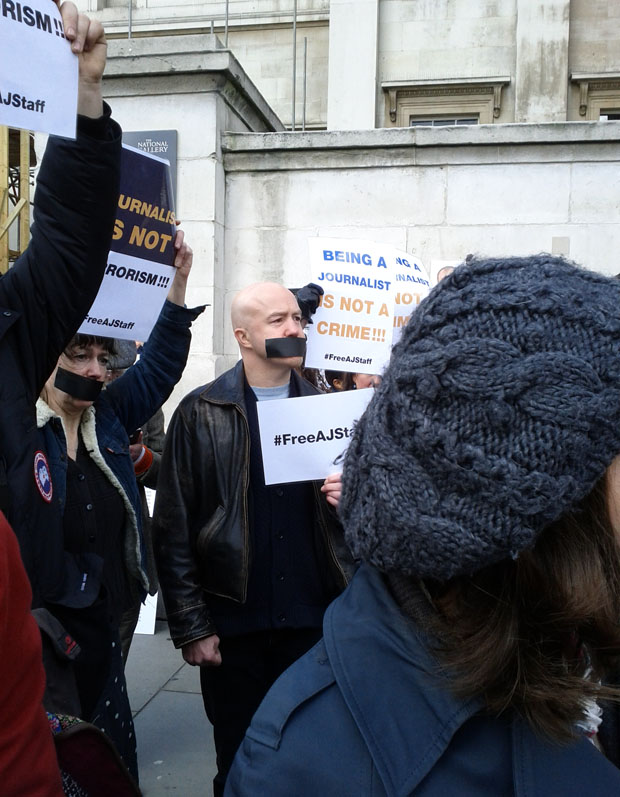
Andy Parsons (Image: Index on Censorship)
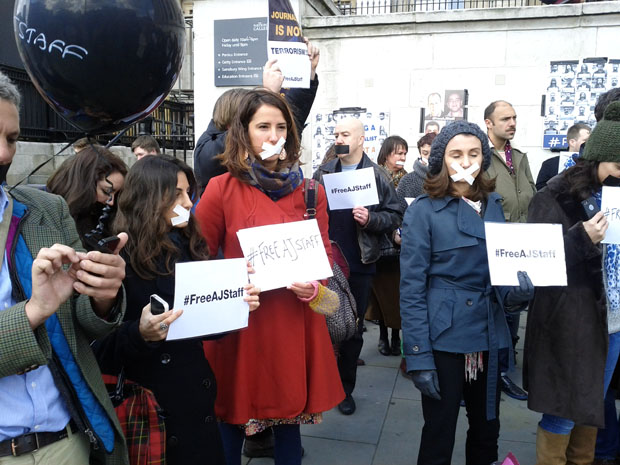
(Image: Index on Censorship)
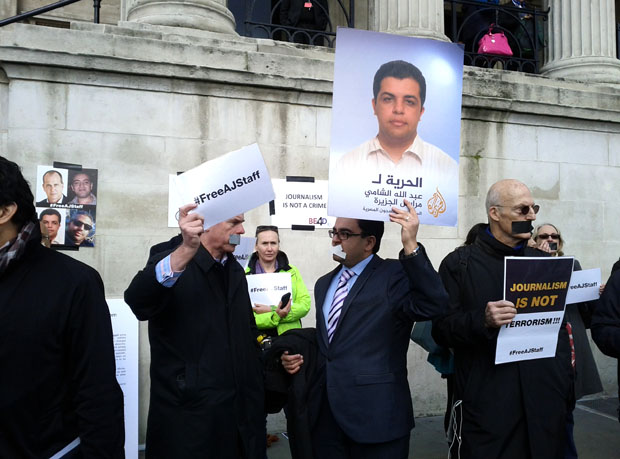
(Image: Index on Censorship)
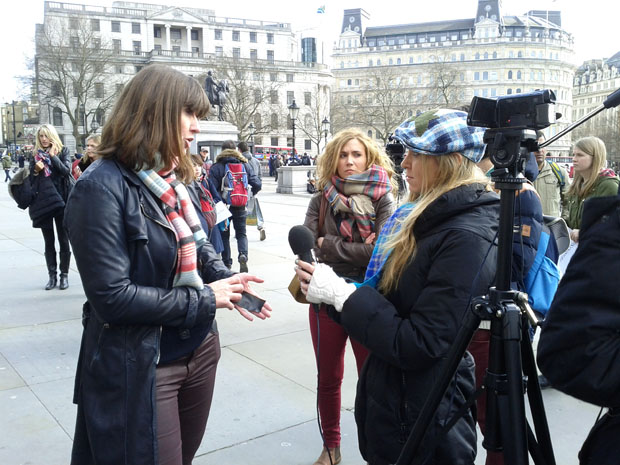
Sue Torton (Image: Index on Censorship)
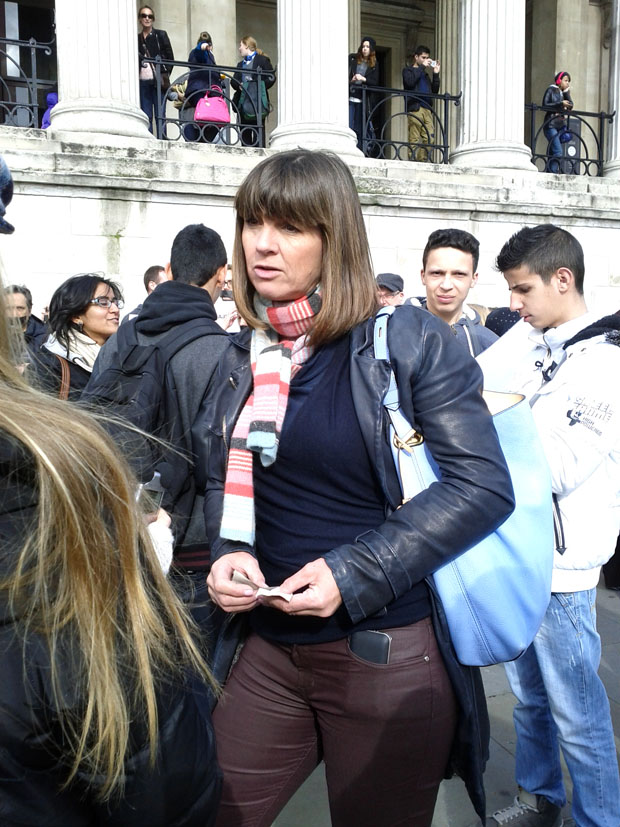
Sue Torton (Image: Index on Censorship)
This article was posted on 21 February 2014 at indexoncensorship.org
















